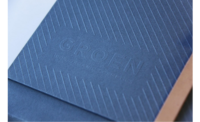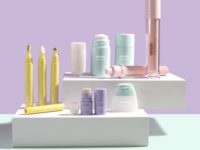Market Trends: Personal Care Packaging
The Sustainable Beauty Movement
Beauty and personal care brands are finding innovative ways to cut packaging waste in order to appeal to consumers.

From products sold bare to compostable paper and reusable containers, beauty brands are making the move toward more sustainable and eco-friendly packaging options. We can thank the millennial generation, as well as the Generation Z up-and-comers, for pushing this movement.
Eco-friendly concerns have led brands to consider sustainable materials such as recycled paper, bamboo, post-consumer recycled plastics and even reusable food-grade containers, as well as packaging-free options. Following are just a few brands putting forth the effort of shrinking their carbon footprint by, among other methods, using sustainable packaging materials.
Farm-to-Face Beauty
LOLI BEAUTY uses reusable food-grade containers and compostable plastics for all of its BIY (blend-it-yourself) product packaging. Claiming to be the first organic zero waste beauty brand, LOLI (Living Organic Loving Ingredients) products are waterless with upcycled, organic superfood ingredients, making the chosen containers fit well with the line.

Tina Hedges, CEO/Founder of LOLI BEAUTY, shares that the decision to go with reusable food containers was a conscious change. “I consider LOLI a food company reinventing beauty and look to clean, sustainable food brands for inspiration. I also wanted to eliminate all the excess plastic packaging and the use of 80-95 percent water in formulations,” she says.
The company partnered with Elevate Packaging (elevatepackaging.com) to develop 100 percent bio-compostable bags (instead of secondary cartons) and worked with three vendors — two to create the material and one for printing. “The bag feels like plastic and looks like plastic but is compostable in 180 days. We’re also using 100 percent certified compostable labels that we apply to our food-grade reusable glass containers,” Hedges says.
Her inspiration started as a teenager, where Hedges learned homemade beauty tips from her Cuban mother — “like steaming your face with chamomile and using honey as a mask.” Years later at Estée Lauder and L’Oreal, she collaborated with chemists in the labs to develop many of the beauty products in bathroom cabinets around the world. Most of the time, she says, they got inspiration from food trends and ingredients.
“Back in 2000 I remember finding an artisanal fair trade supplier of Argan oil from the Chicago Food Expo and writing a memo about how Argan oil would be a hot face, body and hair ingredient to my boss, whose reaction was: ‘No one will put oil on their face and it will make their hair greasy!’ Flash forward and several years later, Argan is a common skin and hair ingredient,” Hedges says.
She adds that argan oil is just one example of the influence of food and beverage trends leading into beauty. Mangosteen, turmeric and avocado are now staple ingredients in products as well. Hedges saw consumers being able to shop, customize and use these ingredients as they wanted, according to their personal needs.
Years later, Hedges began delving into a more holistic approach to beauty wellness — including making and using her own beauty products. “Add in one light-bulb moment when I was advising a start-up in the face oil category, and sipping on a $12 juice smoothie staring at the olive oil casks at a retail outpost of the Filling Station in Chelsea Markets. I knew then that my mission was to launch LOLI BEAUTY, a destination for superfood, organic beauty that makes it easy to blend-it-yourself pure, potent and personalized products,” she recalls.

The brand believes in simplifying blending for on-demand customization. The BASE products are multi-taskers for face, body and hair that are ready to use and require no blending. Depending on skin or hair needs, consumers can personalize by adding the MIX-IN products at home. LOLI also curates the best combinations with “Shop The Recipes” selections. And at pop-up blending bars, consumers can get on-the-spot customization.
LOLI waters (juices, hydrosols, ferments), brûlées (balms and salves), jellies (gels), grains and pastes (scrubs and masks) come in the reusable glass containers with certified compostable labels. The primary products (BASES and MIX-INS) use the compostable bags.
Replenishing the Earth
Seed Phytonutrients, which just launched on Earth Day this year, is also shaking up the beauty aisle. The Doyletown, Pennsylvania–based company has a simple goal: to create an environment of harmonious beauty, agriculture and sustainable business. And they do this, in part, by their packaging.
The brand uses both 100 percent post-consumer recycled (PCR) paper along with a PCR inner plastic lining for its shower-safe, paper bottle, both of which are recycled and recyclable. Not only is the packaging sustainable, but the seeds are the basis in all products — sunflower and camelina — and sourced from organic American farms.
A part of Seed Phytonutrients’ mission is to lead environmental sustainability; the brand is “obsessed” with reducing plastic in oceans and landfills. With the PCR paper and plastic for the Ecologic (ecologic.com) bottles, 60 percent less plastic than a typical shampoo bottle is used.
Preserving seeds and preventing over-commercialization is important to the brand as well. So, for a nice surprise when the product is gone, consumers can crack open the bottle to reveal a packet of heirloom seed varieties to start their own gardens and help with preserving seed variety in the U.S.
The entire hair, face and body line includes hair cleanser, hair and body oil, lightweight conditioner, heavy duty conditioner, facial cleanser, facial lotion, facial glow serum, facial rejuvenating mask, body cleanser, body moisturizer, bar soap, liquid hand wash and hand salve.
With so many natural ingredients and virtually no limit to the products that the brand can produce, more are already in the works.
According to a GlobalData (globaldata.com) survey, 75 percent of consumers worldwide think that living an ethical or sustainable lifestyle is important to creating a feeling of wellbeing. One major challenge for brands and packaging companies, however, is to convince consumers that sustainable packaging materials are worth the extra cost.
|
On the Soapbox: Mission Personal Another brand that does more than sell products is Soapbox. The mission of Soapbox is just as important as the product. Each Soapbox purchase donates a bar of soap to someone in need and funds hygiene education taught by the people in the communities the company serves. Co-founder and CEO David Simnick started Soapbox because he saw that need firsthand. While working as a sub-contractor with the U.S. Agency for International Development (USAID) he realized that clean water was being provided, but soap and hygiene lessons were not. So in 2010, he and his best friend started Soapbox in their college dorm kitchen, making the first batch of soap. “Our mission is to empower people to change the world through everyday, quality purchases. For every product sold, we donate a bar of soap to someone in need (either here in the U.S.A. or abroad),” says Simnick. “We practice sustainable giving by working with local soap makers in the communities we serve when possible.”

Products contain a unique code so consumers could be a part of the giving that they make possible, from start to finish. All of the products have a Hope Code printed on the back. Consumers can enter the code on the company website to find out where their donation went; the aid partner Soapbox worked with to make it happen; and the specific project they’re working on. Soapbox shampoo, conditioner, body wash, bar soap and liquid hand soap contain jojoba oil, aloe, shea butter and a benefit extract/oil such as argan oil, bamboo extract, coconut oil or tea tree extract. Soaps incorporate shea butter, olive oil, detoxifying sea salt and extracts/oils. All current products are paraben free, EDTA free, made in the U.S.A., cruelty free and vegan to PETA standards. The bottles are recyclable and some use PCR. Soapbox partnered with How2Recycle on the current product line, and the label instructs consumers how to properly recycle the bottles when empty. Since its inception, Soapbox had undergone several design changes in an effort to compete on shelf against major and upstart brands in a cluttered category. “Anthem’s new packaging redesign for Soapbox’s personal care line elevates the brand and connects consumers to the social mission in a powerful storytelling experience,” said John-Paul Doyle, senior creative director at Anthem Worldwide (anthemww.com). Soap Box has donated to more than 65 countries including Cambodia, Costa Rica, Fiji, Haiti, Honduras, India and more, as well as to homeless shelters and food banks in the U.S., with a goal to keep the world clean, one bar at a time. |
Looking for a reprint of this article?
From high-res PDFs to custom plaques, order your copy today!








